|
|
|
Sort Order |
|
|
|
Items / Page
|
|
|
|
|
|
|
| Srl | Item |
| 1 |
ID:
157592
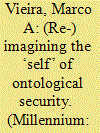

|
|
|
|
|
| Summary/Abstract |
In this article, I critically engage with and develop an alternative approach to ontological security informed by Jacques Lacan’s theory of the subject. I argue that ontological security relates to a lack; that is, the always frustrated desire to provide meaningful discursive interpretations to one’s self. This lack is generative of anxiety which functions as the subject’s affective and necessary drive to a continuous, albeit elusive, pursuit of self-coherence. I theorise subjectivity in Lacanian terms as fantasised discursive articulations of the Self in relation to an idealised mirror-image other. The focus on postcolonial states’ subjectivity allows for the examination of the anxiety-driven lack generated by the ever-present desire to emulate but also resist the Western other. I propose, therefore, to explore the theoretical assertion that postcolonial ontological security refers to the institutionalisation and discursive articulation of enduring and anxiety-driven affective traces related to these states’ colonial pasts that are still active and influence current foreign policy practices. I illustrate the force of this interpretation of ontological security by focusing on Brazil as an example of a postcolonial state coping with the lack caused by its ambivalent/hybrid self-identity.
|
|
|
|
|
|
|
|
|
|
|
|
|
|
|
|
| 2 |
ID:
157594


|
|
|
|
|
| Summary/Abstract |
This article is a collective response to ‘Planet Politics’ by Anthony Burke et al., which was published in this journal in 2016, and billed as a ‘Manifesto from the End of IR’. We dispute this claim on the basis that rather than breaking from the discipline, the Manifesto provides a problematic global governance agenda which is dangerously authoritarian and deeply depoliticising. We substantiate this analysis in the claim that Burke et al. reproduce an already failed and discredited liberal cosmopolitan framework through the advocacy of managerialism rather than transformation; the top-down coercive approach of international law; and use of abstract modernist political categories. In the closing sections of the article, we discuss the possibility of different approaches, which, taking the Anthropocene as both an epistemological and ontological break with modernist assumptions, could take us beyond IR’s disciplinary confines.
|
|
|
|
|
|
|
|
|
|
|
|
|
|
|
|
| 3 |
ID:
157590
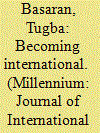

|
|
|
|
|
| Summary/Abstract |
The ‘international’ can be conceived of as a highly sought after symbolic capital. People seek to internationalise their curriculum vitae or resumes, study international subjects, get international diplomas, travel internationally, obtain international jobs. As symbolic capital the ‘international’ can be converted into ‘profit’ complementing other forms of capital (economic, cultural and social capital), deployed in struggles for social domination. It is used as a strategy of social positioning and social domination quasi-globally, but it is not recognised everywhere in the same way. We are particularly interested in the unequal distribution of this symbolic capital, the way differential conversion rates and social boundaries operate in the generation of social inequalities. For this, we will work with and against Bourdieu, in analysing the ‘international’ as a source of a highly contextual form of symbolic power, deployed in a variety of social group formations, but with uneven, differential effects, a naturalised and disguised form of domination. Ultimately, this article problematises how claims to ‘internationality’ operate in social relations and power-struggles and provides an analytical framework hereof.
|
|
|
|
|
|
|
|
|
|
|
|
|
|
|
|
| 4 |
ID:
157595


|
|
|
| 5 |
ID:
157596
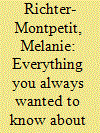

|
|
|
|
|
| Summary/Abstract |
Queer International Relations’ momentum in the past four years has made it inconceivable for disciplinary IR to make it ‘appear as if there is no Queer International Theory’. The ‘queer turn’ has given rise to vibrant research programmes across IR subfields. Queer research is not only not a frivolous distraction from the ‘hard’ issues of IR, but queer analytics crack open for investigation fundamental dimensions of international politics that have hitherto been missed, misunderstood or trivialised by mainstream and critical approaches to IR. As queer research is making significant inroads into IR theorising, a fault line has emerged in IR scholarship on sexuality and queerness. Reflecting the tensions between Lesbian, Gay, Bisexual and Transgender (LGBT) Studies and Queer Theory in the academy more broadly, the IR literature on (homo)sexuality largely coalesces into two distinct approaches: LGBT and Queer approaches. The article will lay out the basic tenets of Queer Theory and discuss how it diverges from LGBT Studies. The article then turns to the books under review and focuses on the ways in which they take up the most prominent issue in contemporary debates in Queer Theory: the increasing inclusion of LGBT people into international human rights regimes and liberal states and markets. The article finishes with a brief reflection on citation practices, queer methodologies and the ethics of queer research.
|
|
|
|
|
|
|
|
|
|
|
|
|
|
|
|
| 6 |
ID:
157593
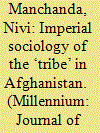

|
|
|
|
|
| Summary/Abstract |
The ‘tribe’ is a notion intimately related to the study of Afghanistan, used as a generic signifier for all things Afghan, it is through this notion that the co-constitution of coloniser and colonised is crystallised and foregrounded in Afghanistan. By tracing the way in which the term ‘tribe’ has been deployed in the Afghan context, the article performs two kinds of intellectual labour. First, by following the evolution of a concept from its use in the early 19th century to the literature on Afghanistan in the 21st century, wherein the ‘tribes’ seem to have acquired a newfound importance, it undertakes a genealogy or intellectual history of the term. The Afghan ‘tribes’ as an object of study, follow an interesting trajectory: initially likened to Scottish clans, they were soon seen as brave and loyal men but fundamentally different from their British interlocutors, to a ‘problem’ that needed to be managed and finally, as indispensable to a long-term ‘Afghan strategy’. And second, it endeavours to describe how that intellectual history is intimately connected to the exigencies of imperialism and the colonial politics of knowledge production.
|
|
|
|
|
|
|
|
|
|
|
|
|
|
|
|
| 7 |
ID:
157591


|
|
|
|
|
| Summary/Abstract |
We draw on work on popular culture, critical geopolitics, visual politics, affect and the everyday in order to develop a framework for the analysis of the ritual of beer consumption as discursive intervention. Specifically, we argue the need for International Relations to expand theories of visual politics to a broader ‘sensory politics’, incorporating taste, smell, and touch. For our case study, we explore the empirical contestation of dominant geopolitical discourses, critically analysing the production and consumption of two explicitly and intentionally political beers: Norwegian brewery 7 Fjell’s release of ‘The Donald Ignorant IPA’; and Scottish BrewDog’s production of ‘Hello, My Name is Vladimir’. Conceptualising the ritual of these beers’ consumption as affective, effigial, and corporeal discursive interventions, we encourage a move beyond the visual to the sensory, in order to make sense of beers’ (limited) potential for resistance within everyday IR.
|
|
|
|
|
|
|
|
|
|
|
|
|
|
|
|
| 8 |
ID:
157589
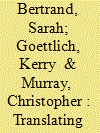

|
|
|
|
|
| Summary/Abstract |
The discipline of International Relations long has been identified and characterized as ‘American’ or ‘Anglo-American’.1 While recent work contests this assumption, either by giving a platform to different types of ‘regional IR’,2 or by bringing to light the interconnected colonial origins of the discipline,3 the discipline of International Relations remains dominated by US-based journals, scholars, and top-ranked programmes.4 The fact that all of this work is produced and carried out in the English language underpins and supports the US dominance in the field.
|
|
|
|
|
|
|
|
|
|
|
|
|
|
|
|
|
|
|
|
|